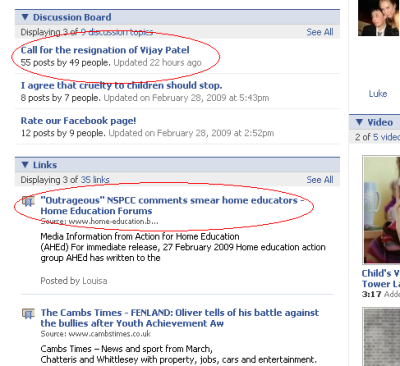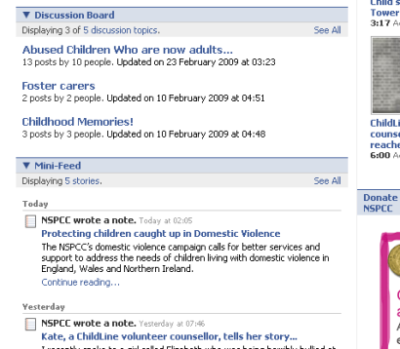Everybody's favourite fake charity, the NSPCC, has been taking a bit of a kicking at its Facebook site, with home educators, outraged by the NSPCC's linking of HE with child abuse, giving full vent to their feelings about being slurred in this way.
Rather than engage, the NSPCC has first denied doing anything wrong and has now tried to kill the debate by deleting the criticism in its entirety.
Here's the Facebook page before

And here it is now

Pretty much every trace of the criticism is gone, with only official responses from HE organisations like AHEd remaining. It looks as though they've got rid of the links section completely, presumably because they can't control what people are saying about them on other sites.
This is shameful behaviour.
Outrageous slur followed by innocent denial is a familiar tactic in political circles of course - I'm reminded of the Haltemprice & Howden by-election, when Labour backbenchers dropped heavy hints that David Davis was romanticly involved with Shami Chakrabarti. The smear was outrageous, and clarifications and apologies followed in due course, but by then the damage was done. This kind of subterfuge is the way of the world among politicians: acting without honour or decency is a mark of strength, showing remorse a sign of weakness.
But for a charity to behave in this way is a surprise, and with our conspiracy theorist hats on we can wonder if the NSPCC's sudden lurch into political hatcheting doesn't actually have the fingerprints of government spin doctors on it. Either way, a charity, especially a big one like the NSPCC, shouldn't be adopting the "apologise, shrug shoulders and move on" approach that suffices for the political classes. It has to deal with criticism in a public manner. Its charitable status depends on providing a public benefit, something that it is arguably no longer doing if it is facing such vehement disapproval by one sector of the community with which it is involved.
If it doesn't, people might just start to mistake it for an arm of government rather than the charity it purports to be.